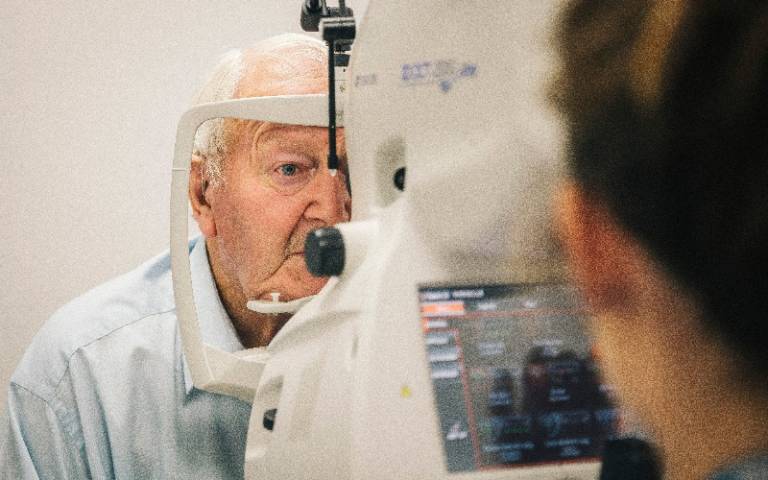Missed eye appointments may increase sight loss post-lockdown
19 June 2020
The COVID-19 lockdown is threatening the sight of thousands of elderly people across the UK as eye clinics have reported more than a 70% reduction in new referrals and a high rate of missed appointments, finds a new study co-led by UCL.

Researchers and national sight loss charity the Macular Society have raised concerns about the long-term impact this will have, as it’s predicted it will have led to between 234 and 470 additional cases of severe sight impairment in April alone.
Since the start of the outbreak ophthalmologists in UK eye clinics have reported as much as a 25% reduction in the number of patients with known age-related macular degeneration (AMD) – the nation’s biggest cause of blindness - attending appointments for sight-saving treatment.
The new report, published as a pre-print on medRxiv and awaiting peer review, from some of the largest clinics in the country has also revealed the significant drop in new patients presenting with wet AMD, a treatable form of the condition.
Moorfields Eye Hospital, King’s College London Hospital, University Hospital Southampton and Whipps Cross Hospital have reported anything from a 65% drop in new referrals to an 87% drop in the first month of the coronavirus outbreak, compared to the same period last year.
One of the authors of the report, Professor Adnan Tufail (Moorfields Eye Hospital and UCL Institute of Ophthalmology) raised concerns that this will increase the burden that COVID-19 is already having on health, well-being and social care costs.
Early treatment may prevent severe vision loss therefore ophthalmologists have urged those at risk to seek treatment, before it is too late.
Professor Tufail said: “We have prioritised appointments for patients who are at a higher risk of their sight deteriorating if left untreated for a short time. It is very important that patient who have symptoms of wet AMD do not ignore their change in vision, as early treatment may prevent severe vision loss.”
Cathy Yelf, Chief Executive of the Macular Society, commented: “We know the earlier wet AMD is treated, the more effective the treatment is, so it’s important if anyone notices any changes to their vision that they get it seen to as soon as possible.
“The number of people affected by macular disease is huge and it is a problem which is only getting worse – without the threat of a pandemic. We fear that after the coronavirus crisis thousands of people will be left blind because they have missed appointments.
“While we understand people’s concerns we know eye clinics across the UK are doing everything they can to ensure patients receiving injections are kept safe and have heard many positive things from people still attending.”
In March all routine appointments in eye clinics were postponed, but injections for wet AMD and other conditions which would cause severe visual loss if not treated, were deemed essential.
It is believed that the drop in referrals is a combination of fear of catching the virus, with those over 70 being instructed to self-isolate, and a lack of routine eye checks taking place after opticians have been closed for routine appointments since the UK went into lockdown.
Professor Tufail said patients should not be frightened of attending hospital as clinics are following guidance from the Royal College of Ophthalmologists as well as Public Health England to ensure everything possible is being done to make sure patients receiving these injections are in a safe environment.
He added: “This data highlights how important it is that patients attend their appointments, and not ignore new symptoms suggestive of wet AMD. We would like to reassure our patients that we have made every effort to ensure they are safe on site, such as the social distancing measures we have introduced and providing face masks on arrival. The sight and safety of our patients is always our priority.”
Report co-author Professor Paul Taylor (UCL Institute of Health Informatics) said: “The next challenge will be helping to work out how we can safely manage clinics to get as many patients as possible onto the appropriate treatment as fast as possible.”
The figures come after the UK Ophthalmology Alliance and the Royal College of Ophthalmologists have calculated that at least 10,000 people with a variety of sight-threatening conditions have missed out on care essential to maintaining their sight in England, Wales and Scotland.
Links
- Pre-print of research paper on medRxiv
- Professor Adnan Tufail’s academic profile
- Professor Paul Taylor’s academic profile
- UCL Institute of Ophthalmology
- UCL Institute of Health Informatics
Image
- Eye exam (Source: Macular Society)
Source
Media contact
Chris Lane
Tel: +44 (0)20 7679 9222
Email: chris.lane [at] ucl.ac.uk
 Close
Close

